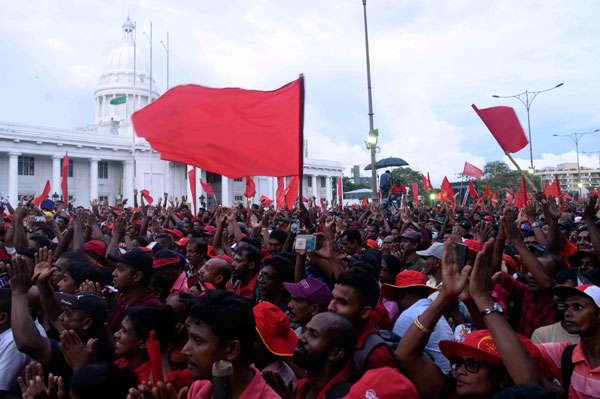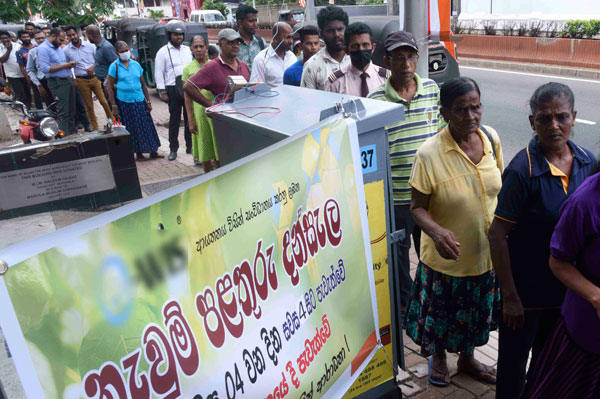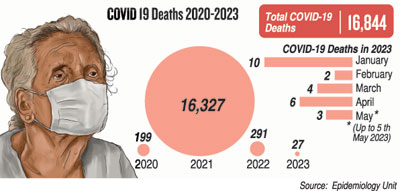News
Covid: Don’t drop your guard, say experts despite WHO declaration
View(s):By Nadia Fazlulhaq
lthough the World Health Organisation on Friday announced it was ending the COVID-19 global emergency it declared three years ago, there is no room for complacency yet. The virus, in one form or another, is still with us. And what’s worse? More cases are being detected while the country is gripped by influenza and increasing cases of dengue.
WHO Chief Tedros Adhanom Ghebreyesus said, “It is with great hope that I declare Covid-19 over as a global health emergency.” But WHO officials were also quick to warn that the decision to lift the emergency did not signal an end to the pandemic. They cautioned countries not take this as reason to dismantle Covid response systems.

Public pay little heed to preventive measures such as wearing masks at May Day rallies and dansals. Pix by Amila Jayawardena
In Sri Lanka, health experts note that not many people wear face masks. Hand washing and sanitizers in public places are a thing of the past. The social distance rule is no longer observed. Don’t drop your guard, the health experts warn.
As flu and COVID-19 spread far and wide, health authorities expressed concerns over crowded political rallies, increased tourist arrivals, jam-packed public transport, large gatherings outside Vesak dansals and displays, torrential monsoonal rains, poor hand hygiene and cough etiquette, and limited use of face masks.
Sri Lanka is yet to confirm the presence of the new COVID-19 strain XBB.1.16, also called Arcturus, which has been identified and is spreading rampantly in several countries, including India, the United States, and Singapore.
Two COVID-related deaths were reported here early this week, while about six people test positive daily. Last month, six people died of COVID, and more than 80 cases were reported. But the authorities say the actual number must be much higher as only a limited number of tests are done in hospitals due to budget constraints.

Government Medical Laboratory Technologists Association president Ravi Kumudesh charged health authorities for not resuming PCR tests as a high number of COVID cases were being reported in neighbouring India after several months.
According to the World Health Organisation, the majority of the XBB.1.16 cases are from India (more than 63 percent). At present, India is conducting more than 150,000 tests daily, and as of Friday, more than 30,000 active cases had been reported, according to India’s Health Ministry.
Mr. Kumudesh said that at a time when the new subvariant XBB.1.16 had been declared a ‘variant of interest’ by the WHO and was spreading in nearby countries, the people here had no idea how serious the situation was due to the absence of testing.
Chief Epidemiologist Dr. Samitha Ginige told the Sunday Times that at present an omicron sub-variant was prevalent in the country. However, he said he was unable to confirm whether the new variant, also a sub-variant of omicron, is present in the country.
“Tests are being conducted to confirm the presence of the new variant. If more people are tested for COVID, the figures will be much higher. We are not planning to increase testing. The situation is not alarming,” he said.
Those in the high-risk category—elderly people, persons with chronic illnesses and respiratory conditions, pregnant and lactating mothers, and children—should avoid unnecessary gatherings and crowded places. Dr. Ginige urged people to practise good hand hygiene and wear masks if they had flu symptoms.
Pointing out that there was an increase in mosquito-borne diseases along with flu and COVID, he said people with fever should consult a qualified medical practitioner without delay.
The Sri Lanka Medical Association also urged people to take precautions against the spread of flu accompanied by fever.
“This could be the seasonal influenza or even the new COVID variant. It’s difficult to distinguish as the common symptoms such as cough, cold, and fever are similar. Due to the wide vaccination coverage, there is a level of herd immunity. However, we advise the public to opt for masks if they are having flu symptoms or going to crowded places,” SLMA President Dr. Vinya Ariyaratne said.
Apart from the usual symptoms of COVID-19, such as fever or chills, fatigue, cough, shortness of breath, sore throat, loss of taste or smell, headache, body ache, abdominal discomfort, and runny or congested nose, the new COVID variant XBB.1.16 can cause conjunctivitis or pink eye, experts warn.

The best way to say that you found the home of your dreams is by finding it on Hitad.lk. We have listings for apartments for sale or rent in Sri Lanka, no matter what locale you're looking for! Whether you live in Colombo, Galle, Kandy, Matara, Jaffna and more - we've got them all!

